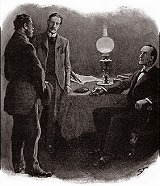“Now, Clayton, tell me all about the fare who came and watched this house at ten o’clock this morning and afterwards followed the two gentlemen down Regent Street.”

The man looked surprised and a little embarrassed. “Why, there’s no good my telling you things, for you seem to know as much as I do already,” said he. “The truth is that the gentleman told me that he was a detective and that I was to say nothing about him to anyone.”
“My good fellow, this is a very serious business, and you may find yourself in a pretty bad position if you try to hide anything from me. You say that your fare told you that he was a detective?”
“Yes, he did.”
“When did he say this?”
“When he left me.”
“Did he say anything more?”
“He mentioned his name.”
Holmes cast a swift glance of triumph at me. “Oh, he mentioned his name, did he? That was imprudent. What was the name that he mentioned?”
“His name,” said the cabman, “was Mr. Sherlock Holmes.”
Never have I seen my friend more completely taken aback than by the cabman’s reply. For an instant he sat in silent amazement. Then he burst into a hearty laugh.
“A touch, Watson - an undeniable touch!” said he. “I feel a foil as quick and supple as my own. He got home upon me very prettily that time. So his name was Sherlock Holmes, was it?”
“Yes, sir, that was the gentleman’s name.”
“Excellent! Tell me where you picked him up and all that occurred.”
“He hailed me at half-past nine in Trafalgar Square. He said that he was a detective, and he offered me two guineas if I would do exactly what he wanted all day and ask no questions. I was glad enough to agree. First we drove down to the Northumberland Hotel and waited there until two gentlemen came out and took a cab from the rank. We followed their cab until it pulled up somewhere near here.”
“This very door,” said Holmes.
“Well, I couldn’t be sure of that, but I dare say my fare knew all about it. We pulled up halfway down the street and waited an hour and a half. Then the two gentlemen passed us, walking, and we followed down Baker Street and along- -”
“I know,” said Holmes.
“Until we got three-quarters down Regent Street. Then my gentleman threw up the trap, and he cried that I should drive right away to Waterloo Station as hard as I could go. I whipped up the mare and we were there under the ten minutes. Then he paid up his two guineas, like a good one, and away he went into the station. Only just as he was leaving he turned round and he said: ‘It might interest you to know that you have been driving Mr. Sherlock Holmes.’ That’s how I come to know the name.”
“I see. And you saw no more of him?”
“Not after he went into the station.”
“And how would you describe Mr. Sherlock Holmes?”
The cabman scratched his head. “Well, he wasn’t altogether such an easy gentleman to describe. I’d put him at forty years of age, and he was of a middle height, two or three inches shorter than you, sir. He was dressed like a toff, and he had a black beard, cut square at the end, and a pale face. I don’t know as I could say more than that.”
“Colour of his eyes?”
“No, I can’t say that.”
“Nothing more that you can remember?”
“No, sir; nothing.”
“Well, then, here is your half-sovereign. There’s another one waiting for you if you can bring any more information. Good-night!”
“Good-night, sir, and thank you!”
John Clayton departed chuckling, and Holmes turned to me with a shrug of his shoulders and a rueful smile.